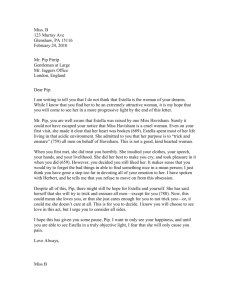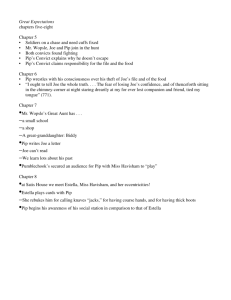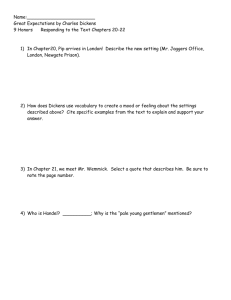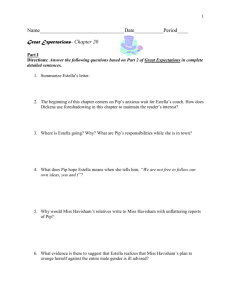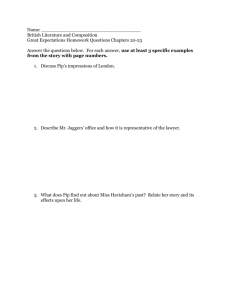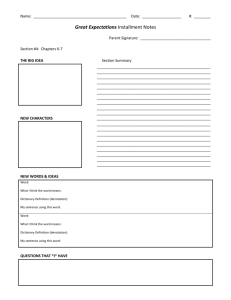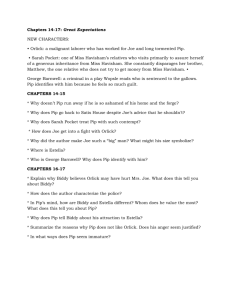GT 3 Summary
advertisement
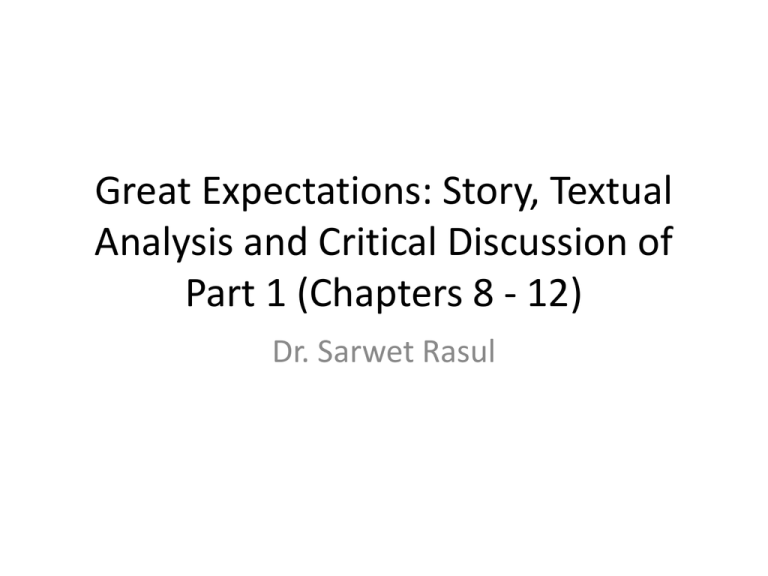
Great Expectations: Story, Textual Analysis and Critical Discussion of Part 1 (Chapters 8 - 12) Dr. Sarwet Rasul Summary of previous lesson • • • • • • Introduction to Part 1 (Chapters 1-7) of the novel Explored the text of these chapters Explored themes Discussed the development of characters Critically analyzed the text Discussed several important points 2 Scheme of exploring the text • Division in 3 Parts: Total chapters 59 • Part 1: Chapters total chapters 19 3 Today’s Session • Introduction to Part 1 (Chapters 8 onwards) of the novel • Will explore the text of these chapters • Explore themes • Discuss the development of characters • Critically analyze the selected parts of text • Discuss several important points related to the development of plot 4 Part I: Chapter 8 • • • • • • • • • Pip spends the evening at Mr. Pumblechook's and is brought to Miss Havisham's after a meagre breakfast. There they meet Estella whgo is a young girl. She is “very pretty”, however, she seems to be “very proud”. Estella lets Pip in. She guides him through a dark house by candle and leaves him outside a door. As he knocks at the door he is allowed to enter. There he meets Miss Havisham, a willowy, yellowed woman dressed in an old wedding gown. She calls for Estella. It is on the order of Miss Havisham that the two play cards, despite Estella's objection that Pip was just a "common labouring-boy." It is very interesting to notice that in response to this complaint of Estella Miss Havisham says: “Well, you can break his heart." Estella insults Pip's coarse hands and his thick boots as they play. Pip feels insulted, and later cries as he eats lunch in the great house's yard. Estella lets him out of the yard and he walks back a long distance of four miles in very low spirits, feeling disgusted at his insult. 5 Text Chapter 8 • For such reasons I was very glad when ten o’clock came and we started for Miss Havisham’s; though I was not at all at my ease regarding the manner in which I should acquit myself under that lady’s roof. Within a quarter of an hour we came to Miss Havisham’s house, which was of old brick, and dismal, and had a great many iron bars to it. Some of the windows had been walled up; of those that remained, all the lower were rustily barred. There was a court-yard in front, and that was barred; so, we had to wait, after ringing the bell, until some one should come to open it. While we waited at the gate, I peeped in (even then Mr. Pumblechook said, ‘And fourteen?’ but I pretended not to hear him), ……………………………………………………… 6 Cont… Text Chapter 8 • • ……………………. and saw that at the side of the house there was a large brewery. No brewing was going on in it, and none seemed to have gone on for a long long time. A window was raised, and a clear voice demanded ‘What name?’ To which my conductor replied, ‘Pumblechook.’ The voice returned, ‘Quite right,’ and the window was shut again, and a young lady came across the courtyard, with keys in her hand. ‘This,’ said Mr. Pumblechook, ‘is Pip.’ ‘This is Pip, is it?’ returned the young lady, who was very pretty and seemed very proud; ‘come in, Pip.’ Mr. Pumblechook was coming in also, when she stopped him with the gate. ‘Oh!’ she said. ‘Did you wish to see Miss Havisham?’ ‘If Miss Havisham wished to see me,’ returned Mr. Pumblechook, discomfited. ‘Ah!’ said the girl; ‘but you see she don’t.’ She said it so finally, and in such an undiscussible way, that Mr. Pumblechook, though in a condition of ruffled dignity, could not protest. But he eyed me severely - as if I had done anything to him! - and departed with the words reproachfully delivered: ‘Boy! Let your behaviour here be a credit unto them which brought you up by hand ………………………………………………… 7 Cont… Text Chapter 8 • …………………….. I was not free from apprehension that he would come back to propound through the gate, ‘And sixteen?’ But he didn’t. My young conductress locked the gate, and we went across the court-yard. It was paved and clean, but grass was growing in every crevice. The brewery buildings had a little lane of communication with it, and the wooden gates of that lane stood open, and all the brewery beyond, stood open, away to the high enclosing wall; and all was empty and disused. The cold wind seemed to blow colder there, than outside the gate; and it made a shrill noise in howling in and out at the open sides of the brewery, like the noise of wind in the rigging of a ship at sea. She saw me looking at it, and she said, ‘You could drink without hurt all the strong beer that’s brewed there now, boy.’ ‘I should think I could, miss,’ said I, in a shy way. ‘Better not try to brew beer there now, or it would turn out sour, boy; don’t you think so?’ ‘It looks like it, miss.’ ‘Not that anybody means to try,’ she added, ‘for that’s all done with, and the place will stand as idle as it is, till it falls. As to strong beer, there’s enough of it in the cellars already, to drown the Manor House.’ ………………. 8 Cont… Text Chapter 8 …….‘Is that the name of this house, miss?’ ‘One of its names, boy.’ ‘It has more than one, then, miss?’ ‘One more. Its other name was Satis; which is Greek, or Latin, or Hebrew, or all three - or all one to me - for enough.’ ‘Enough House,’ said I; ‘that’s a curious name, miss.’ ‘Yes,’ she replied; ‘but it meant more than it said. It meant, when it was given, that whoever had this house, could want nothing else. They must have been easily satisfied in those days, I should think. But don’t loiter, boy.’ Though she called me ‘boy’ so often, and with a carelessness that was far from complimentary, she was of about my own age. She seemed much older than I, of course, being a girl, and beautiful and self-possessed; and she was as scornful of me as if she had been one-and-twenty, and a queen. We went into the house by a side door - the great front entrance had two chains across it outside - and the first thing I noticed was, that the passages were all dark, and that she had left a candle burning there. She took it up, and we went through more passages and up a staircase, and still it was all dark, and only the candle lighted us……………. 9 Cont… Text Chapter 8 ………At last we came to the door of a room, and she said, ‘Go in.’ I answered, more in shyness than politeness, ‘After you, miss.’ To this, she returned: ‘Don’t be ridiculous, boy; I am not going in.’ And scornfully walked away, and - what was worse - took the candle with her. This was very uncomfortable, and I was half afraid. However, the only thing to be done being to knock at the door, I knocked, and was told from within to enter. I entered, therefore, and found myself in a pretty large room, well lighted with wax candles. No glimpse of daylight was to be seen in it. It was a dressing-room, as I supposed from the furniture, though much of it was of forms and uses then quite unknown to me. But prominent in it was a draped table with a gilded looking-glass, and that I made out at first sight to be a fine lady’s dressing-table. Whether I should have made out this object so soon, if there had been no fine lady sitting at it, I cannot say. In an arm-chair, with an elbow resting on the table and her head leaning on that hand, sat the strangest lady I have ever seen, or shall ever see. 10 Cont… Text Chapter 8 ………She was dressed in rich materials - satins, and lace, and silks all of white. Her shoes were white. And she had a long white veil dependent from her hair, and she had bridal flowers in her hair, but her hair was white. Some bright jewels sparkled on her neck and on her hands, and some other jewels lay sparkling on the table. Dresses, less splendid than the dress she wore, and halfpacked trunks, were scattered about. She had not quite finished dressing, for she had but one shoe on - the other was on the table near her hand - her veil was but half arranged, her watch and chain were not put on, and some lace for her bosom lay with those trinkets, and with her handkerchief, and gloves, and some flowers, and a prayer-book, all confusedly heaped about the looking-glass. It was not in the first few moments that I saw all these things, though I saw more of them in the first moments than might be supposed. But, I saw that everything within my view which ought to be white, had been white long ago, and had lost its lustre, and was faded and yellow. I saw that the bride within the bridal dress had withered like the dress, and like the flowers, and had no brightness left but the brightness of her sunken eyes. I saw that the dress had been put upon the rounded figure of a young woman, and that the figure upon which it now hung loose, had ………………….. 11 Cont… Text Chapter 8 …………………….shrunk to skin and bone. Once, I had been taken to see some ghastly waxwork at the Fair, representing I know not what impossible personage lying in state. Once, I had been taken to one of our old marsh churches to see a skeleton in the ashes of a rich dress, that had been dug out of a vault under the church pavement. Now, waxwork and skeleton seemed to have dark eyes that moved and looked at me. I should have cried out, if I could. ‘Who is it?’ said the lady at the table. ‘Pip, ma’am.’ ‘Pip?’ ‘Mr. Pumblechook’s boy, ma’am. Come - to play.’ ‘Come nearer; let me look at you. Come close.’ It was when I stood before her, avoiding her eyes, that I took note of the surrounding objects in detail, and saw that her watch had stopped at twenty minutes to nine, and that a clock in the room had stopped at twenty minutes to nine. ‘Look at me,’ said Miss Havisham. ‘You are not afraid of a woman who has never seen the sun since you were born?’ I regret to state that I was not afraid of te ‘Do you know what I touch here?’ she said, laying her hands, one upon the other, on her left side. ‘Yes, ma’am.’ (It made me think of the young man.) ‘What do I touch?’ ‘Your heart.’ ‘Broken!’ She uttered the word with an eager look, and with strong emphasis, and with a weird smile that had a kind of boast in it. Afterwards, she kept her hands there for a little while, and slowly took them away as if they were heavy. Telling the enormous lie comprehended in the answer ‘No.’ 12 Points to Ponder: A Critical Analysis Imagery and Symbols: • Dickens uses of strong imagery and symbols to describe Miss Havisham's house • These symbols raise a lot of questions. Also they provide a lot of clues for answers. How is Pip's first experience of interaction with "higher society“? • A bitter experience • It leaves him ashamed • He is embarrassed • He is angry What is his status there? • A toy, a puppet, a source of enjoyment • A play thing • Torn between being insulted and his attraction to Estella, Pip feels what? He feels ashamed of his upbringing -- so much so that he "wished Joe had been rather more genteelly brought up." His new found respect and love for Joe was being spoiled by his embarrassment of being brought up in a lower class family. 13 Critical Comments Character of Miss Havisham: • She is psychologically imbalanced. • She is hard-hearted. • She proudly wears her emotional wounds like a badge of honor. • Time has no meaning for her as she has stopped all the clocks in her house at the exact time that her wedding was canceled. • She is dosinterested in days and weeks. She does not want to know what day of the week it is. • She has not seen the sun in many years. • She aims at exacting revenge on all men, and the first time Pip notes this is when Miss Havisham tells Estella to break his heart. 14 Text from Chapter 8 But, when she was gone, I looked about me for a place to hide my face in, and got behind one of the gates in the brewery-lane, and leaned my sleeve against the wall there, and leaned my forehead on it and cried. As I cried, I kicked the wall, and took a hard twist at my hair; so bitter were my feelings, and so sharp was the smart without a name, that needed counteraction. My sister’s bringing up had made me sensitive. In the little world in which children have their existence whosoever brings them up, there is nothing so finely perceived and so finely felt, as injustice. It may be only small injustice that the child can be exposed to; but the child is small, and its world is small, and its rocking-horse stands as many hands high, according to scale, as a big-boned Irish hunter. Within myself, I had sustained, from my babyhood, a perpetual conflict with injustice. I had known, from the time when I could speak, that my sister, in her capricious and violent coercion, was unjust to me. I had cherished a profound conviction that her bringing me up by hand, gave her no right to bring me up by jerks. Through all my punishments, disgraces, fasts and vigils, and other penitential performances, I had nursed this assurance; and to my communing so much with it, in a solitary and unprotected way, I in great part refer the fact that I was morally timid and very sensitive. 15 Part I: Chapter 9 • • • • • Pip is forced to talk about his day to Mrs. Joe and Mr. Pumblechook. His sister is eager to know everything that happened and when he does not answer, she beats him by pounding him on the head and shoving his face into the wall. Pip does not feel they will understand even if he tells them what he saw, and he does not want to expose Miss Havisham to their criticisms. Finally, he makes up lies about black coaches, cake and wine on gold plates, and waving flags and swords. Later, Pip tells Joe the truth, and also confesses that he is embarrassed about being a "commoner" because of his attraction to Estella. Joe reassures him that he is not common, he is uncommon small and an uncommon scholar. Referring to Pip's lies, he adds, "If you can't get to be oncommon through going straight, you'll never get to do it through going crooked." 16 Points to Ponder: A Critical Analysis • • • • • Pip’s concern over being commoner Joe's right analysis of it Pip tries to become "uncommon" by lying about his experiences. Pip made up lies about the Satis House with the intention of glorifying it in front of his sister and the eager Mr. Pumblechook. He thinks that he can become uncommon by being dishonest, or, as Joe called it by being "crooked." Joe on the other hand tells that he is uncommon in his own way. 17 Themes in Chapters 7, 8, 9 Themes of Guilt, gratitude, fantasy, secrecy • Pip feels guilty when Joe describes what an ugly baby Pip was. • He also feels deeply grateful that Joe took him in anyway. • Mrs. Joe and Pumblechook impart their good news about Miss Havisham by first reminding Pip how grateful he needs to be, and Pumblechook constantly admonishes Pip to be forever grateful to them that brought him up by hand. • Secrecy is seen with Joe not wanting Mrs. Joe to know about his lessons, and Pip's willingness to lie just to keep his sister and Pumblechook from knowing the details about Miss Havisham. • Again he feels guilty doing this, but he wants to protect Miss Havisham from the judgements his sister and Pumblechook may pass. 18 Themes in chapters 8, 9 Themes of • Desire for upward social mobility • Ambition • Snobbery • Inferiority • These themes start appearing from here onwards. • They appear when Joe compliments him for being a scholar, Pip notes that he should like to be, evidence that even at this young age he has a drive to achieve something more in life than those around him. Pip sees all the seeds in the little drawers at Pumblechook's store and wonders if they want to be free of their jails to grow. This symbolizes the themes of freedom and growth. No doubt, Pip's sister and her condescending attitude toward Joe and his work also fuel this drive. She has made it clear she does not like her station in life. 19 Relationship of Joe and Mrs. Joe • • • • • Joe is a loyal man. He is kind hearted. He is genuinely good. He calls his wife a fine figure of a woman and a mastermind. When Pip tries to pick a fight with him on these counts, Joe stops it with a fixed look and a firm word. This shows he knows where to be strong enough. He is also very astute and aware. Mrs. Joe likes "governing" the house and he recognizes her skills in this regard. Knowing she will be threatened if he starts to become educated, he insists on keeping his lessons with Pip a secret. 20 Part I: Chapter 10 • • • • • • • • Pip’s desire to to impress Estella need him to become less coarse. He finds some weight in Joe's advice who said, "you must be a common scholar afore you can be a oncommon one”. So, he decided to be less coarse and or this he wants to get education. Biddy is the best possible source of help that he can think of. So, to impress Estella, Pip goes to Biddy for tutoring. Pip simply wants to be uncommon and wants to be less coarse so that he can be acceptable for Estella. He asks Biddy at the small school to help him get educated. Mr. Wopsle's greataunt's school is little more than a play school and Pip understands it will be hard to concentrate on some actual learning, but Biddy agrees and gives Pip some books to start with. One evening, on the way home, Pip goes into a pub to pick up Joe. He finds Joe sitting with a stranger, a man with one eye pulled closed and a worn hat on his head. The strange man asks Joe all kinds of personal questions, some about Pip's relation to him, the whole time staring at Pip. Pip starts feeling uncomfortable. At one point, the man stirs his drink with Joe's file -- the file Pip stole to give to the convict! Pip knows the man has been sent by his convict and is terrified that his secret will be revealed. But, as Joe and Pip depart, the stranger hands Pip a coin wrapped in paper. When they get home, to Pip’s surprise the paper is actually a two pound note. Thinking it was a mistake (though Pip knows somehow that it wasn't) Joe runs back to the pub to give it back but he is late and the man is gone. 21 Text from Chapter 10 • He was a secret-looking man whom I had never seen before. His head was all on one side, and one of his eyes was half shut up, as if he were taking aim at something with an invisible gun. He had a pipe in his mouth, and he took it out, and, after slowly blowing all his smoke away and looking hard at me all the time, nodded. So, I nodded, and then he nodded again, and made room on the settle beside him that I might sit down there. But, as I was used to sit beside Joe whenever I entered that place of resort, I said ‘No, thank you, sir,’ and fell into the space Joe made for me on the opposite settle. The strange man, after glancing at Joe, and seeing that his attention was otherwise engaged, nodded to me again when I had taken my seat, and then rubbed his leg - in a very odd way, as it struck me…………………… 22 Cont…Text from Chapter 10 ……….He stirred his rum-and-water pointedly at me, and he tasted his rum-and-water pointedly at me. And he stirred it and he tasted it: not with a spoon that was brought to him, but with a file. He did this so that nobody but I saw the file; and when he had done it he wiped the file and put it in a breastpocket. I knew it to be Joe’s file, and I knew that he knew my convict, the moment I saw the instrument. I sat gazing at him, spell-bound. But he now reclined on his settle, taking very little notice of me, and talking principally about turnips. 23 Points to Ponder: A Critical Analysis • It is ironic that Pip who is excited at the beginning of the chapter by the prospect of educating himself to become uncommon, is reminded of his common, and low status through the entry of the convict on the scene. • This conflict is found affecting his dreams as he goes to sleep. He is indeed bothered by the fact that it is uncommon to be "on secret terms of conspiracy with convicts." • Dickens has played around the term “ uncommon”. Theme of mystery: • The man clearly knew something about Pip assisting the convict and wanted Pip to know that he did. How he knows remains a mystery. • This would lead towards a lot of mysteries that Pip would come across in the upcoming chapters. 24 Part I: Chapter 11 • • • • • • After some days, Pip returns to Miss Havisham ‘s house. This time, the house seems full of people waiting to see her but she sees him first. She asks Pip to walk her from her bedroom to the wedding-feast room. The room has a large table with a rotting bug-infested bride-cake. Estella and the toady relatives join them and Pip watches as Miss Havisham amuses herself by annoying them. Food and the cake are years old, untouched except by a vast array of rats, beetles and spiders which crawl freely through the room. As far as the guests are concerned, there are four guests brought in. We see Sarah Pocket, a "vicious," "dry, brown, corrugated woman;" Georgiana, "the grave lady;“. We also see as a guest Camilla, an old melodramatic woman; and her husband namely Cousin Raymond. All are, apparently, the same age or a little younger than the withered Miss Havisham and all come to see her on the same day of the year that is her birthday as well as the day of her marriage when the cake was set out and the clocks were stopped so many years ago. 25 Text from Chapter 11 ‘Then go into that opposite room,’ said she, pointing at the door behind me with her withered hand, ‘and wait there till I come.’ I crossed the staircase landing, and entered the room she indicated. From that room, too, the daylight was completely excluded, and it had an airless smell that was oppressive. A fire had been lately kindled in the damp old-fashioned grate, and it was more disposed to go out than to burn up, and the reluctant smoke which hung in the room seemed colder than the clearer air - like our own marsh mist. Certain wintry branches of candles on the high chimneypiece faintly lighted the chamber: or, it would be more expressive to say, faintly troubled its darkness. It was spacious, and I dare say had once been handsome, but every discernible thing in it was covered with dust and mould, and dropping to pieces. The most prominent object was a long table with a tablecloth spread on it, as if a feast had been in preparation when the house………… 26 Cont…Text from Chapter 11 ………………and the clocks all stopped together. An epergne or centrepiece of some kind was in the middle of this cloth; it was so heavily overhung with cobwebs that its form was quite undistinguishable; and, as I looked along the yellow expanse out of which I remember its seeming to grow, like a black fungus, I saw speckled-legged spiders with blotchy bodies running home to it, and running out from it, as if some circumstances of the greatest public importance had just transpired in the spider community. I heard the mice too, rattling behind the panels, as if the same occurrence were important to their interests. But, the blackbeetles took no notice of the agitation, and groped about the hearth in a ponderous elderly way, as if they were shortsighted and hard of hearing, and not on terms with one another. These crawling things had fascinated my attention and I was watching them from a distance, when Miss Havisham laid a hand upon my shoulder. In her other hand she had a crutchheaded stick on which she leaned, and she looked like the Witch of the place. ‘This,’ said she, pointing to the long table with her stick, ‘is where I will be laid when I am dead. They shall come and look at me here.’ ……………….. 27 Miss Havisham tells about herself: Some more TEXT ‘On this day of the year, long before you were born, this heap of decay,’ stabbing with her crutched stick at the pile of cobwebs on the table but not touching it, ‘was brought here. It and I have worn away together. The mice have gnawed at it, and sharper teeth than teeth of mice have gnawed at me.’ She held the head of her stick against her heart as she stood looking at the table; she in her once white dress, all yellow and withered; the once white cloth all yellow and withered; everything around, in a state to crumble under a touch. ‘When the ruin is complete,’ said she, with a ghastly look, ‘and when they lay me dead, in my bride’s dress on the bride’s table which shall be done, and which will be the finished curse upon him - so much the better if it is done on this day!’ 28 Cont…Miss Havisham tells about herself: Some more TEXT Miss Havisham continues walking around the room, saying little to her guests, until the mention of a certain Matthew, whereupon she stops short. She dismisses them and tells Pip it is her birthday. She continues to point out Estella's beauty to Pip, then sends him to be fed outside again. While outside he meets and fights with a pale young gentleman. Estella is ecstatic over this display and even rewards Pip for winning the fight by letting him kiss her. . Pip kisses her on the cheek. The guests leave, and Miss Havisham once again asks that Estella and Pip play cards as she watches. 29 Points to Ponder: A Critical Analysis • • • • • Pip is introduced to a number of strange characters in this chapter. He is also given some more hints about Miss Havisham's strange lifestyle. We find that Miss Havisham's relationship with her relatives -Georgiana, Sarah Pocket, Cousin Raymond, and Camilla -- is even more loveless than her relationship with Pip. For her relatives, their visit to Miss Havisham is based on greed, hoping to please her enough to be given some of her money at her death. Miss Havisham also knows it very well. Dickens uses symbols to indicate this when Miss Havisham refers to her dead body laid out as a meal for her relatives on the same table where her decaying cake is placed now. 30 Summary of Today’s Session • • • • • • We covered Part 1(chapters 8 to 12) of the novel Explored the text of these chapters Explored themes Discussed the development of characters Critically analyzed the selected parts of text Discussed several important points related to the development of plot 31 References of works consulted • • • • • • • • • • CHARLES DICKEN’S GREAT EXPECTATIONS. (2007) Edited and with an introduction by Harold Bloom. Viva Books Private Limited: New Delhi DICKENS: A COLLECTION OF CRITICAL ESSAYS (1967). Edited by Martin Price. Prentice-Hall, Inc., Englewood Cliffs. New Jersey http://www.cliffsnotes.com www.gradesaver.com www.enotes.com www.bartleby.com www.gutenberg.org http://www.helium.com http://www.studymode.com http://thebestnotes.com 32 Thank you very much! 33
